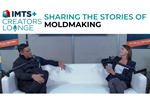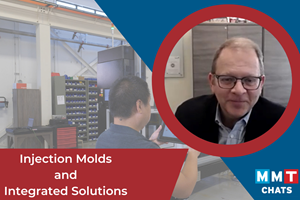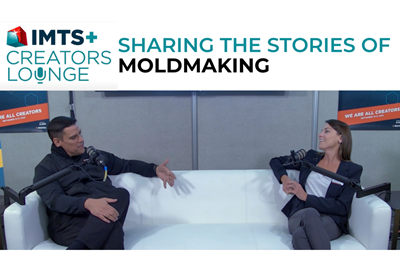
Build a sales playbook around knowledge, actions, communication and effective presentations. Source | Stock, Copilot
Sales function as a vital role in driving business success in mold manufacturing. Far from a simple "order-taking" role, today's sales professionals must navigate complex customer needs, industry trends and cutting-edge technologies to secure new business and maintain strong customer relationships. Yet, this crucial function is often misunderstood, leading to under appreciation of the strategic value it brings to the table.
Sales is crucial to mold builders today because sales professionals are responsible for acquiring new customers, maintaining relationships with existing ones and ensuring a steady stream of work and revenue for the shop. “They serve as the vital link between the customer and the moldmaker, translating requirements into actionable specifications,” says Keith A. Bradt, owner and business development director for Kallan Sales Development.
To unlock the full potential of sales teams, mold shop owners and leadership teams should invest in an onboarding playbook that equips new hires with the knowledge, skills and tools to succeed. This playbook should address not only the technical aspects of the sales process, but also the soft skills and industry-specific expertise required to excel.
“A well-designed sales playbook can be the key to unlocking the full potential of a mold shop's sales team. By providing a structured, comprehensive onboarding process, mold shop owners can empower their sales professionals with the knowledge, skills and tools needed to drive business growth and maintain a competitive edge.”
Breaking Down the Playbook
The foundation of a successful sales playbook should be structured around four key elements: “What do new hires need to know, what actions do they need to perform, how they effectively communicate in both what they say and what they present,” explains Bradt.
1. What They Need to Know
- Ideal customer profile
- Buyer personas, motivations and pain points
- Unique value proposition
- Established sales methodology
2. What They Do
- Stages of the sales process
- Tactics within each stage to drive engagement
- Exit criteria for moving opportunities forward
3. What They Say
- Core messaging and talking points
- Questioning techniques for effective discovery
- Responses to common objections
4. What They Show
- Marketing-approved content and collateral
- Appropriate usage of materials throughout the sales process
By breaking down the learning process into these key areas, mold shop owners can help new hires develop a well-rounded understanding of the sales role and the tools at its disposal.
Tailoring the Onboarding Journey
One-size-fits-all onboarding simply won't cut it in today's sales landscape. Mold shops must tailor their approach to accommodate different levels of sales experience, from junior hires to seasoned professionals.
Bradt suggests, “Onboarding new sales hires should be looked at as a journey not a single 'boot camp' event and should be different for varying levels of sales experience, different rolls within your sales team, and based on your specific sales process (transactional vs. complex).”
For example, a more experienced sales professional might benefit from shadowing existing customers or sitting in on meetings, while a junior team member may require more focus on mastering prospecting techniques and inside sales support before transitioning to a full-fledged sales role.
Structuring a 30/60/90 Day Plan
To ensure new hires hit the ground running, implement a structured 30/60/90 day onboarding plan. This incremental approach offers a more efficient onboarding process and quicker contribution from the new team member.
In the first 30 days, the focus should be on prospecting techniques and understanding the ideal customer profile. “You may be hiring a seasoned professional, or not, but do they know how to specifically sell in a manner that aligns with your shop's value, capabilities and goals?” asks Bradt.
The 60-day mark should then shift to process training, covering CRM usage, document management and the sales pipeline. “Here, you can educate on specific documents that might be required, such a new job intake or RFQ forms, pipeline tracking tools or account planning templates, for example,” says Bradt.
Finally, the 90-day plan should delve into product and technology training, helping new hires to fully understand how the mold shop's offerings align with customer needs and how to effectively communicate the value proposition.
Blending Process and Soft Skills
Onboarding a sales team requires a delicate balance between teaching the technical aspects of the role and developing crucial soft skills. “CRM usage and document management are a function of how you align your process with the available technology. Your sales technology should act in parallel to your sales process so that it is used as part of your daily work,” says Bradt.
For example, Bradt suggests that aside from getting available training on the user interface, begin with educating where documentation is kept and how the system is used as part of the process so the new hire understands why it is important to use these tools and the impact it has on sales operations.
Example of a typical tool used to measure relevant metrics that not only measure business but individual sales representative performance. Source | Kallan Sales Development
“This will ensure they see it as a valuable tool and not a means to micromanage. A clear understanding of the features used in the management pipeline, such as reports and dashboards, is critical as well, so there is a clear expectation set as to how the new team member will be measured and held accountable. After that, it is easy to have them learn the system's mechanics such as entering in accounts, contacts and deals,” says Bradt.
Soft skill development, on the other hand, can be more challenging to standardize. He recommends incorporating activities like situational role-playing, demonstration videos and team-based pipeline reviews to nurture these interpersonal capabilities.
“While things like discovery scripts or objection handling documents help, the individual delivery and tone of the message is crucial as it needs to come off as genuine and not rehearsed. You will often find here that multiple team members will collaborate before pipeline reviews, helping to elevate the entire teams operating level,” says Bradt.
Developing Standardized "Plays"
A well-crafted sales playbook should include standardized “plays” for handling common objections or conducting effective discovery calls. These pre-developed scripts and templates remove the guesswork for sales professionals, boost their confidence and lead to more consistent, effective customer interactions.
“Develop discovery question outlines based on the information you need to properly assess opportunity fit versus organizational fit, measure the effectiveness of individual email outreach to determine which ones result in successful customer engagement and use those to develop email templates for the team to use and monitor deals that are won and lost to look for common trends that can be used to build out successful selling tactics,” says Bradt.
Integrating Certifications
Incorporating industry-specific certifications into the onboarding process can further enhance the credibility and expertise of the sales team. Bradt notes that this approach builds trust with clients, as they recognize they are working with knowledgeable professionals who understand their technical needs.
In the mold shop environment, sales professionals with certifications in areas like moldmaking, materials and machinery can communicate more effectively with customers and the team. This alignment of knowledge and skills ensures a unified, consistent approach to customer interactions.

Prioritize detailed buyer personas to target key decision-makers effectively. Source | Kallan Sales Development
Understanding Buyer Personas
A comprehensive sales playbook must also prioritize the development of detailed buyer personas. This clearly outlines the exact type of company you want to do business with and the typical behaviors of the key decision-makers within that organization.
“Typically, this involves identifying the size of the organization, a specific market segment you want to target and the particular needs of key stakeholders. This analysis then helps to understand how these stakeholders prefer to research information and make purchasing decisions. As a result, it clearly outlines the types of prospects with whom you are most likely to succeed in securing new opportunities. It also helps identify how your shop's value proposition aligns with what your customers value and provides guidance for your sales team on how to effectively navigate customer interactions,” says Bradt.
This playbook can provide a roadmap for navigating each interaction and closing deals more effectively.
Measuring Playbook Effectiveness
Ultimately, the true test of a sales playbook's success lies in its ability to reduce onboarding time and improve new hire performance. Bradt suggests a multifaceted approach to tracking the playbook's impact, including:
- Monitoring non-selling time and turnover rates
- Measuring lead velocity rate and win rates
- Tracking stage-to-stage conversion timing
- Analyzing the results of prospecting activities
“Also, by keeping an eye on result-based activities such as the number of prospecting calls that result in a demo or discovery call, as well as monitoring stage-to-stage conversion timing, you can better understand if your onboarding process is effective if your team is gaining knowledge adoption and where there might be weaknesses that suggest additional training is needed,” says Bradt.

Comprehensive onboarding that includes structured learning paths equips sales professionals with skills to boost growth and keep mold shops competitive. Source | Kallan Sales Development
Unlocking the Full Potential of Sales
A well-designed sales playbook can be the key to unlocking the full potential of a mold shop's sales team. By providing a structured, comprehensive onboarding process, mold shop owners can empower their sales professionals with the knowledge, skills and tools needed to drive business growth and maintain a competitive edge.
“The availability of information has empowered buyers more than ever and in many cases they are 70% or better through their vendor discovery before even reaching out to sales. This has only increased the need to focus on the health and structure of the sales organization,” says Bradt.
Related Content
MMT Chats: Mold Builder Shares “Raw and Real” Social Media Strategy
MoldMaking Technology Editorial Director Christina Fuges sits down with Murphy Forsyth, GM – Injection Molding and Director Of Marketing for Zero Tolerance LLC in Clinton Township, MI.
Read MoreMMT Chats: Mastering Mold Shop Sales Strategies
Learn to navigate empowered buyers, balance technical skills and relationships, customize onboarding, foster team collaboration and measure sales success.
Read MoreMMT Chats: Injection Molds and Integrated Solutions Through Ambition and Innovation
Jordan Robertson, VP, Business Development and Marketing for StackTeck discusses various mold technologies to improve efficiencies in automation, cooling, lightweighting and sustainability.
Read MoreHow EOS Helped a Mold Builder Boost Efficiency, Profits and Growth
Wepco Plastics adopted EOS, transforming their culture, improving on-time delivery and exceeding profit targets. By implementing structured processes and goal-setting, they achieved sustainable growth and invested in other manufacturing companies.
Read MoreRead Next
IMTS+ Creators Lounge: Sharing the Stories of Moldmaking
Founder/CEO of Industrial Strength Marketing James Soto welcomed MoldMaking Technology editorial director Christina Fuges into the IMTS+ Creators Lounge to talk about sharing the stories of manufacturing using social media and digital tools.
Read MoreFour-Step Formula for Mold Builders to Use in Their Marketing That Increases Sales
The most common marketing mistakes, some key marketing questions to land new business and how the Theory of Constraints applies to marketing within the small to midsize manufacturer.
Read MoreMMT Chats: Mold Builder Shares “Raw and Real” Social Media Strategy
MoldMaking Technology Editorial Director Christina Fuges sits down with Murphy Forsyth, GM – Injection Molding and Director Of Marketing for Zero Tolerance LLC in Clinton Township, MI.
Read More
























